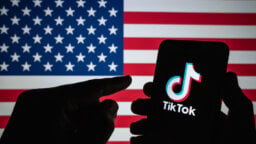The US Congress has passed legislation effectively banning TikTok if the short-form video app’s owner, Chinese tech giant ByteDance, fails to sell the business.
The bill, which passed the Senate on Tuesday (April 23) with a 79-18 vote, follows years of escalating tensions between the US and China over TikTok. Lawmakers have long expressed concerns that the Chinese government could access vast amounts of user data, including location, search history, and potentially even private messages, posing a national security threat.
The Trump administration attempted to ban TikTok in 2020 through executive order, but those efforts were ultimately blocked by the courts. Since then, talks between the US government and ByteDance to address security concerns proved unsuccessful.
The passage of the bill was expedited after being included in a larger $95 billion foreign and military aid package passed by the Senate on Tuesday (April 23). The bill included billions of dollars for Israel, Taiwan and Ukraine.
Following the passage of the foreign aid package, President Joe Biden said, “Congress has passed my legislation to strengthen our national security and send a message to the world about the power of American leadership: we stand resolutely for democracy and freedom, and against tyranny and oppression.”
Last month, lawmakers in the US House of Representatives passed a standalone version of the TikTok divest-or-ban bill, known officially as the Protecting Americans from Foreign Adversary Controlled Applications Act, in a bipartisan, 360-58 vote.
The revised Senate version gives ByteDance more time to sell TikTok (270 days, compared to 165 days in the original version od the bill) plus a possible three-month extension if a sale is actively underway. The legislation also restricts ByteDance’s control over TikTok’s core algorithm, the powerful tool that tailors content based on user preferences and has been a key factor in the platform’s success.
Senator Maria Cantwell, Chair of the Senate Commerce Committee, on Tuesday reiterated that the Congress is “not acting to punish the app but to prevent foreign adversary espionage against Americans, members of the US military and government personnel.”
“Congress is not acting to punish ByteDance, TikTok or any other individual company. Congress is acting to prevent foreign adversaries from conducting espionage…”
Maria Cantwell, US Senator
“Congress is not acting to punish ByteDance, TikTok or any other individual company. Congress is acting to prevent foreign adversaries from conducting espionage, surveillance, maligned operations, harming vulnerable Americans, our servicemen and women, and our US government personnel,” said Cantwell.
The bill now heads to President Biden’s desk. Last month, the president indicated his willingness to sign the bill.
“If they pass it, I’ll sign it,” Biden was quoted by CBS News as saying in an address to reporters.
ByteDance had previously said that it would oppose any attempt to force it to sell TikTok, indicating that it would take the US to court if the bill becomes law.
“At the stage that the bill is signed, we will move to the courts for a legal challenge,” Michael Beckerman, TikTok’s head of public policy for the Americas, wrote in an internal memo to TikTok staff obtained by The Information.
“Banning a social media platform that hundreds of millions of Americans use to express themselves would have devastating consequences for all of our First Amendment rights, and will almost certainly be struck down in court.”
Jenna Leventoff, American Civil Liberties Union
The potential ban has sparked anxiety among millions of American users who rely on TikTok for entertainment, education, and social connection.
Jenna Leventoff, senior policy counsel at the American Civil Liberties Union, said, “This is still nothing more than an unconstitutional ban in disguise.”
“Banning a social media platform that hundreds of millions of Americans use to express themselves would have devastating consequences for all of our First Amendment rights, and will almost certainly be struck down in court. The Senate must strip these provisions from the bill.”
Some have also raised concerns about the economic impact of the ban, as TikTok boasts over 170 million active users in the US and generates substantial advertising revenue.
“TikTok seems to be taking quite a bit of business away from US social media. A ban would give the American companies a chance to catch up.”
Eric Maskin, Harvard University
The Financial Times reported last month that TikTok generated $16 billion in US revenues. However, some experts suggest that banning TikTok in the US could support American companies.
“TikTok seems to be taking quite a bit of business away from US social media. A ban would give the American companies a chance to catch up,” said Eric Maskin, Professor of Economics and Mathematics at Harvard University.
Music Business Worldwide





